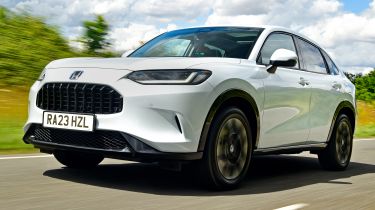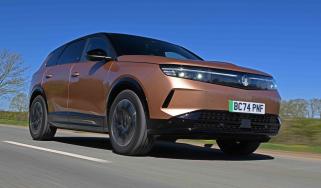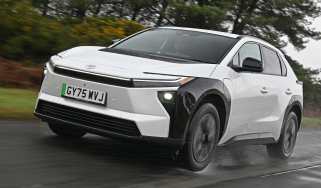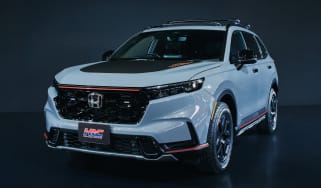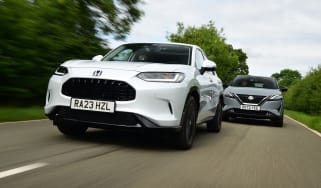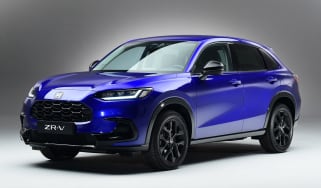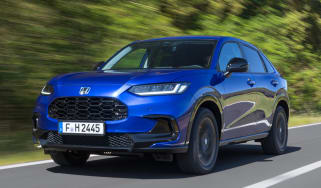Honda ZR-V review: family SUV impresses but is pricey
Honda’s answer to the Nissan Qashqai features a slick hybrid setup and generous cabin space, but it’s not without its flaws

The Honda ZR-V shows an understanding of what a lot of people want from a mid-size SUV. It’s very spacious, well built and offers impressive real-world fuel economy thanks to its hybrid powertrain. The simple, logical cabin and infotainment set-up are also plus points, as is the generous amount of standard equipment.
However the ZR-V is several thousand pounds more expensive to buy than hybrid versions of the Honda’s more practical, and arguably better looking, family SUV rivals. We also can’t help but feel that most buyers would be better served by Honda’s highly acclaimed Civic hatchback, as it uses the same hybrid setup and is better value for money.
Our choice: Honda ZR-V e:HEV Sport
About the Honda ZR-V
Honda, like all major car makers, has recognised that SUVs are what brings in the big bucks. That’s why the Japanese brand recently doubled the number of SUVs in its lineup, with the new mid-size ZR-V and all-electric e:Ny1 joining the familiar compact HR-V and larger CR-V. The latter has actually grown in size for the latest sixth-generation model, which has allowed the ZR-V to sit underneath.
That puts the ZR-V in the firing line of some of the best-selling cars in the UK, including the head-turning Hyundai Tucson – our Mid-size SUV of the Year for the past three years – plus the tech-filled Kia Sportage and Renault Austral, comfort-focused Citroen C5 Aircross, versatile Skoda Karoq and Volkswagen Tiguan, and hugely popular Nissan Qashqai. There are also plenty of all-electric family cars it competes with, including the Hyundai Ioniq 5, Nissan Ariya and Skoda Enyaq iV.
Used - available now
The ZR-V is, in effect, a crossover version of Honda’s popular family hatchback, and our Affordable Hybrid Car of the Year for 2023, the Civic. It uses the same platform as the Civic, and like the acclaimed hatch, it’s only available with Honda’s e:HEV hybrid powertrain. This combines a four-cylinder petrol engine under the bonnet with two electric motors, all working together to drive the front wheels.
The engine is mainly used as a generator to power its minute 1.05kWh battery pack, which in turn feeds the electric motors, but it can drive the front wheels directly at high speeds. It’s a complex system on paper, but on the road it’s extremely smooth and allows the ZR-V to drive like an EV, just with a petrol engine whirring away in the background.
As well as the sole powertrain option in the ZR-V, there are just three trim levels to choose from: Elegance, Sport and Advance. Even entry-level Elegance models are generously equipped with 18-inch alloy wheels, a 10.2-inch digital driver’s display, nine-inch touchscreen, Android Auto and wireless Apple CarPlay connectivity, front and rear parking sensors, a reversing camera and a suite of driver-assistance and safety features called Honda Sensing.
We’d go for the Sport trim ourselves, as it adds wireless smartphone charging, extra USB ports, a powered tailgate and half-leather seats, plus some styling tweaks. Top-of-the-range Advance models come with a panoramic sunroof and a Bose sound system, among other luxuries. There isn’t much in the way of customisation for ZR-V buyers, with most personalisation coming from a range of colours and exterior styling packs.
Honda ZR-V prices and latest deals
Engines, performance and drive
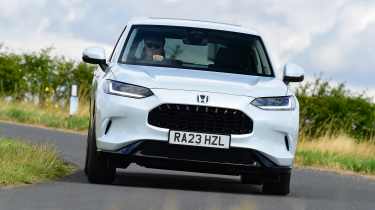
Driving the ZR-V at low speeds feels like you’re actually piloting an EV, as the electric motors are doing all the work. It’s incredibly smooth, easy to control and far more responsive than a combustion-engined SUV. Precise steering and good visibility also make the Honda easy to place on the road, although we did find the ride to be a little fidgety over smaller bumps.
Leave the hustle and bustle of town for a B-road, and it’s soon apparent the ZR-V is not particularly fun to drive. That’s because it’s been set up to be safe and predictable, and it’s exactly that. There’s a reasonable amount of grip through corners, and the feeling of a low centre of gravity is reassuring on those occasions when you need to brake hard.
The ZR-V’s ride comfort improves once you’re on the motorway, where it feels stable. However road noise, particularly from the back axle, is a little more audible than we’d hope for. The lane-departure and blind-spot warning beeps are also too excitable for our liking.
The ZR-V’s variable brake regeneration settings are easy to adjust on the move thanks to the metal paddles behind the steering wheel, but the second you touch either of them, it resets back to the default level. We’d rather it stayed how we left it.
0-62mph acceleration and top speed
Honda says 0-62mph in the ZR-V takes 7.9 seconds and that seems about right. If you’re already going fast enough and the engine is driving the wheels, throttle response is keen. But when you’re cruising on battery power and boot it, there’s a long pause as the petrol engine wakes from its slumber. When it does, the four-cylinder engine is a little droney, but not overly loud. Top speed stands at 108mph.
MPG, CO2 and running costs
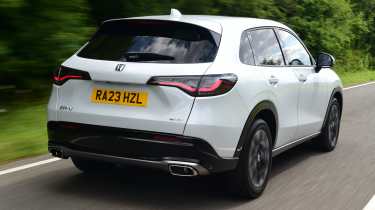
Apart from the Civic Type R hot hatch, every model in Honda’s line-up is now electrified. The ZR-V is a hybrid, but just like the latest Civic hatchback, it doesn’t need to be plugged into a socket or charging point to top up the battery pack.
The ZR-V uses Honda’s e:HEV powertrain, which pairs an Atkinson-cycle 2.0-litre four-cylinder petrol engine with a pair of electric motors, a small battery and an automatic gearbox. The petrol engine spends a lot of its time generating electricity to power the electric motors, rather than actually driving the wheels. You also recover energy via regenerative braking when you slow down.
Depending on which trim level you pick, Honda says the ZR-V produces 130-132g/km of CO2, and can return an average of 48.7-49.6mpg on the WLTP test cycle. During our own testing, the ZR-V managed to achieve 45.6mpg, which isn’t too far off its claimed fuel economy figures, although the 11th-gen Civic returned over 50mpg when we put it through its paces.
One of the advantages of getting a ZR-V over a Civic is the fuel tank. At 57 litres, it’s 27 litres larger than the hatchback’s, so even if it’s a slightly more thirsty car, the ZR-V’s range is much better.
As the ZR-V emits more CO2 emissions than the equivalent plug-in hybrid SUV, and infinitely more than any electric car, it’s not the most appealing choice for company car drivers. The ZR-V attracts a Benefit-in-Kind (BiK) tax rate of 31 per cent, compared to 8 per cent for a Kia Sportage PHEV and 2 per cent for any EV.
Insurance groups
Regardless of trim, the ZR-V sits in insurance group 35 (out of 50). That’s very high for a mid-size SUV, especially as neither the Kia Sportage nor Nissan Qashqai attracts a rating beyond group 26. In fact, the ZR-V will be more expensive to insure than some all-electric SUVs that cost about the same, such as the Skoda Enyaq and Nissan Ariya.
Check if your car needs an MoT and view its complete history with our MoT History Checker...
Depreciation
On average, the Honda ZR-V is expected to retain 51 per cent of its original value after three years of ownership and 36,000 miles of motoring. Our latest expert data projects the Nissan Qashqai and Kia Sportage will both hold on to 48-54 per cent of their list price after the same period.
To get an accurate valuation on a specific model check out our free car valuation tool...
Interior, design and technology
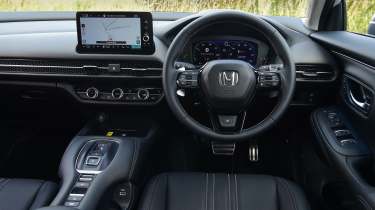
Honda has adopted a more restrained design language in recent years, which was a welcome change after the needlessly complex styling of the previous Civic and CR-V. The Japanese firm also worked hard not to make the ZR-V simply look like a jacked-up version of the 11th-gen Civic, and it has certainly succeeded. However this is not a car we expect will be bought on looks alone. The beak-like nose in particular, with its huge-slatted grille, isn’t nearly as subtle as other Hondas. The Kia Sportage and Hyundai Tucson are more handsome and striking, while the Nissan Qashqai has a rather understated look.
Inside, however, the ZR-V’s cabin looks almost identical to the Civic’s. But that’s not a bad thing, because it’s sensibly thought out. There are lots of soft-touch materials too, and the artificial leather on the dash has a metal-flake finish that creates a subtle sparkle in the light. Build overall is excellent and we’re pleased to see Honda sticking with conventional rotary controls for the heating and ventilation.
The floating centre console is a small flamboyant touch. It houses the array of buttons for selecting gears and drive modes, and a pair of USB ports for charging mobile devices, plus a wireless charging pad on higher-spec models. Every ZR-V features a nine-inch touchscreen, while behind the steering wheel, you’ll find a 10.2-inch fully digital driver’s display.
Equipment levels are generous across the ZR-V’s three trim levels – Elegance, Sport and Advance. As well as the two displays previously mentioned, base Elegance-spec models also come with 18-inch alloy wheels, front and rear parking sensors, a leather steering wheel, heated front seats, a rear-view camera, Android Auto and wireless Apple CarPlay, plus a range of safety and driver-assistance features as part of Honda’s ‘Sensing’ set-up.
Moving up to Sport trim adds some exterior tweaks in the form of a unique front bumper and grille, gloss black mirrors and window trim and matte black wheels. Inside, you’ll find a mix of fabric and synthetic leather trim for the seats, sports pedals, ambient LED lighting, an electric boot lid, wireless smartphone charging and extra USB-C charging ports for rear passengers.
The range-topping Advance builds on that by offering perforated leather seats, a heated steering wheel, panoramic sunroof, diamond-cut alloys, a new Bose sound system and a six-inch head-up display.
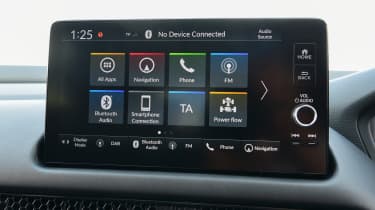
Sat-nav, stereo and infotainment
Compared to the latest family cars and SUVs, the ZR-V’s nine-inch screen is fairly small. However, it’s more than large enough to cover most buyers’ needs. It’s a very simple, intuitive system to use, with the main home page consisting of two rows of shortcut tiles for the main functions. Physical buttons to the side include a back key and a home key, plus a volume dial.
On-screen shortcuts make the Honda’s interface easy to figure out, even if you’re buried in a sub-menu about hybrid powertrain stats. The on-screen mapping is also clear. While the interface itself is easy to figure out, it’s not the quickest system when it comes to loading times or how long it takes to respond to on-screen touches. The wireless Apple CarPlay works fine, but we struggled to establish a connection with Android Auto when we tested the ZR-V; it either dropped instantly or failed to completely connect using various USB cables.
Practicality, comfort and boot space
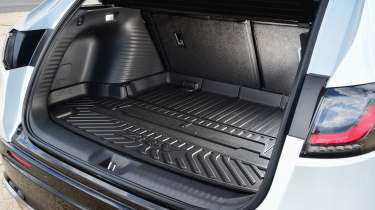
The ZR-V slots neatly in between the compact HR-V and now much larger CR-V SUVs in Honda’s lineup. But despite it being an SUV, the driver’s seat is only mounted 30mm higher than in a Civic hatchback, so the driving position isn’t as commanding as in rivals. It still feels great, though, offering plenty of comfort and lots of adjustment.
Storage in the ZR-V’s cabin is a decidedly mixed bag. The central storage is deep, and the glovebox is quite large, too. On the other hand, the door bins are small; the front ones are narrow and short, while the back pockets will only hold a small bottle.
There’s also a small shelf beneath the floating section of the centre console, which houses two USB ports. Rear passengers get a set of air vents, along with two USB-C ports of their own in all but the base model. The optional rubber boot mat is ideal for carrying muddy boots, and will protect the carpeted floor when loading a bike, for instance.
Dimensions and size
At 4,568mm long, the ZR-V is 137mm shorter than the new CR-V, and 228mm longer than the HR-V. It also has a 2,657mm wheelbase, measures 1,840mm wide and 1,620mm tall.
Leg room, head room & passenger space
Rear passenger space in the ZR-V is very generous, with a simply fantastic amount of legroom available in the back, topping pretty much any other rival in the mid-size SUV segment. We also found during our twin test between the ZR-V and Nissan Qashqai that the Honda’s cabin is wider, though the headroom on offer in the ZR-V is just fine, rather than spectacular.
Boot space
It’s clear that cabin space was the bigger priority for Honda with the ZR-V, as this mid-size SUV has a 380-litre boot (including the underfloor storage). That’s not just smaller than many of its rivals’, but 30 litres less than the Civic’s, too. However the ZR-V’s luggage capacity shrinks by another 10 litres if you upgrade to one of the higher trim levels, because more space is taken up by the Bose subwoofer.
The folding parcel shelf is at least both sturdy and incredibly easy to remove and install, plus the load bay is impressively low and level. The rear seat cushions also slide down and forward when you fold them away, which sees the space on offer grow to 1,301 litres. There are also two bag hooks (rated at 3kg each) and a 12-volt socket in the boot.
Towing
The ZR-V won’t find much appeal among caravanners as it has a maximum towing capacity of 750kg, if you’re pulling a braked trailer. For context, a typical two to four-bed caravan weighs in the region of 1,000kg, and both the Kia Sportage and Nissan Qashqai have towing capacity well in excess of that.
Reliability and safety
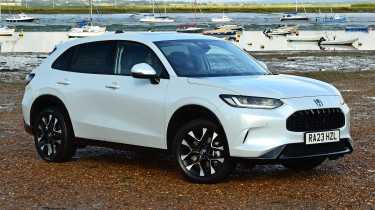
The ZR-V is too new to make an appearance in our Driver Power owner satisfaction survey, and the closely related Civic hatchback didn’t crack our top-75 list of the best cars to own. The only Honda that did this time around was the Jazz supermini, which finished in 32nd place. The Civic and larger CR-V SUV have been rated positively in the past at least.
Honda as a brand didn’t perform especially well in this year’s car manufacturer rankings either, falling from fifth place to 18th. But it did manage to trump premium makers such as BMW, Mercedes and Audi.
Euro NCAP tested the ZR-V in December 2023, but denied it a five-star safety rating - mainly due to the result of the side-impact test where the heads of the driver and front passenger hit each other. The report also noted that the driver monitoring system was able to detect driver fatigue but not distraction. The overall four-star score was broken down into four sections: Adult Occupant Safety, Child Passenger Safety, Vulnerable Road Users and Safety Assist, where respective percentage scores of 79, 86, 81 and 68 were recorded.
Every ZR-V comes as standard with Honda’s ‘Sensing’ range of safety and driver-assistance features, which includes lane departure warning, lane keep assist, traffic sign recognition, driver attention monitoring and ‘Traffic Jam Assist’. Adaptive cruise control, front and rear parking sensors, and a reversing camera are also standard-fit across the range.
Warranty
All new Hondas come with a three-year/90,000-mile warranty, which will provide plenty of cover for anyone planning to lease their car for that amount of time. However it’s not as extensive as five- and seven-year warranties from Hyundai and Kia, though Honda gives buyers the option to extend their coverage to five years.
Servicing
Honda offers 1-4 year service plans for its cars, which includes a service once a year or after 12,500 miles, whichever comes first. You can choose to pay for your plan in a single one-off payment or split the cost over several months.
Deals on Honda ZR-V and alternatives
Frequently Asked Questions
Honda ZR-V e:HEV Sport long-term test
Our current affairs editor Chris Rosamond is running a Honda ZR-V on the Auto Express fleet for six months. It’s early days but he's already impressed with just how much more space it has over its smaller HR-V sibling. Chris has a dog and always found it hard to fit her in the HR-V’s boot due to its sloping roofline, but he’s had no such problems in the ZR-V. The larger cabin also means there’s plenty of room for all the family.
Chris is finding the 2.0-litre hybrid powertrain very efficient, averaging almost 50mpg during his time with the car thus far. However, it’s not all good news as the cabin quality is a little disappointing, especially when you consider the price tag of his e:HEV Sport model is over £40,000. You can read the full long-term test here…
